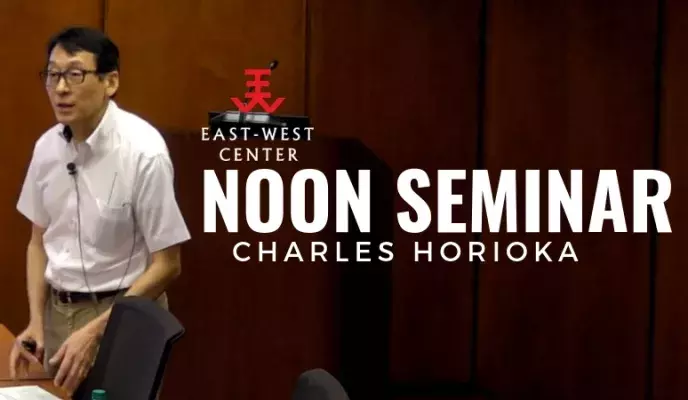Error message

Do individuals in all countries behave rationally or is their behavior influenced by their country’s culture, traditions, and social norms? This presentation attempts to shed light on this question as it relates to saving and bequest behavior in Japan. The findings show that the saving and bequest behavior of the Japanese is rational and determined primarily by demographic and socioeconomic factors but that culture, traditions, and social norms also have some impact.
Video of Charles Yuji Horioka's presentation on 12/4/18 at East-West Center:
Charles Yuji Horioka is Vice-President and Research Professor at the Asian Growth Research Institute, Kitakyushu City, Japan. His research focuses on household consumption, saving, and bequest behavior in Japan, the United States, and developing Asia. He received his B.A. and Ph.D. degrees from Harvard University and previously taught at Kyoto University, Osaka University, University of the Philippines, Stanford University, and Columbia University. In 2001, he was awarded the Japanese Economic Association Nakahara Prize, which is given annually to the most outstanding Japanese economist aged 45 or younger.
Do individuals in all countries behave rationally or is their behavior influenced by their country’s culture, traditions, and social norms? This presentation attempts to shed light on this question as it relates to saving and bequest behavior in Japan. The findings show that the saving and bequest behavior of the Japanese is rational and determined primarily by demographic and socioeconomic factors but that culture, traditions, and social norms also have some impact.
Video of Charles Yuji Horioka's presentation on 12/4/18 at East-West Center:
Charles Yuji Horioka is Vice-President and Research Professor at the Asian Growth Research Institute, Kitakyushu City, Japan. His research focuses on household consumption, saving, and bequest behavior in Japan, the United States, and developing Asia. He received his B.A. and Ph.D. degrees from Harvard University and previously taught at Kyoto University, Osaka University, University of the Philippines, Stanford University, and Columbia University. In 2001, he was awarded the Japanese Economic Association Nakahara Prize, which is given annually to the most outstanding Japanese economist aged 45 or younger.






